
The Winner of Kamchatka race “Beringia-2022'
/ Главная / Russkiy Mir Foundation / Publications / The Winner of Kamchatka race “Beringia-2022'The Winner of Kamchatka race “Beringia-2022'
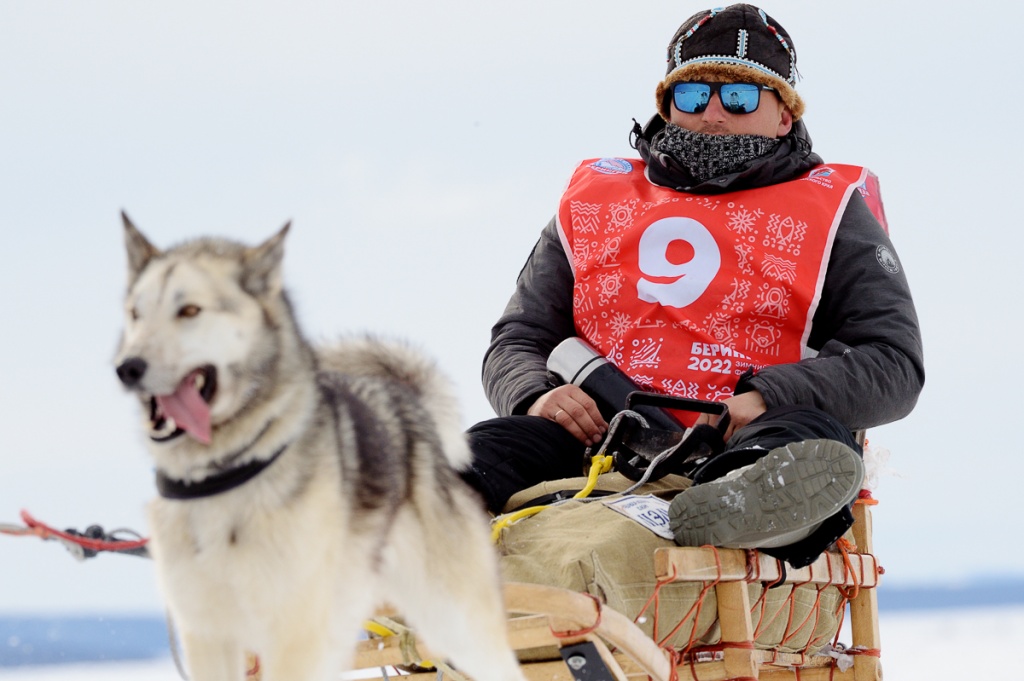
Valentin Levkovsky. Photo courtesy of Vasiliy Rusin
It is easy to recognize Valentin Levkovsky, a Kamchatka dog-team musher, at the start of the most large-scale and prestigious Beringia dog sled race. He wears his grandfather's sheepskin coat. it is the traditional outfit of the Itelmens, the indigenous people of Kamchatka. Levkovsky's dogs pull traditional wooden sleds rather than metal ones, as professionals do. Furthermore, they understand "halch" ("go") and other commands in the Itelmen language.
Every year, the participants of Beringia overcome 1,000 kilometers (621 miles) and spend nights in the taiga. If you want to know how long this race has been held in Kamchatka, simply ask Valentin Levkovsky for his age, which is the same for both him and the race. Having turned 32, the hereditary musher has already won the Beringia four times (the last time was in 2022) getting very close to the historical record.
Valentin Levkovsky explained to Russkiy Mir how he raises winning dogs. He also commented on his chances of outrunning the Alaskan mushers in their snows and told about the first race won by his small son who was born in a marriage with a French female musher.
Following in his father's footsteps
The Levkovsky family comes from the village of Ust-Khayryuzovo. The champion's father, Nikolay Levkovsky, is the one who made their surname known in the sports world. He recalls that he first bestrode a dog like a horse and rode around the village at the age of three. When his hands gained the power to hold the leashes, he got into the sled.
He used to visit his grandparents instead of the kindergarten to experience the authentic life of the Itelmens. He did his best to pass the folk traditions and his love for dogs down to his son who was raised under more modern conditions. These days they manage a dog kennel together. They competed in a race only once, and Levkovsky junior won. Although, Valentin believes it means nothing. "It is a rather challenging task to find two good sled dog teams in one family," he says.
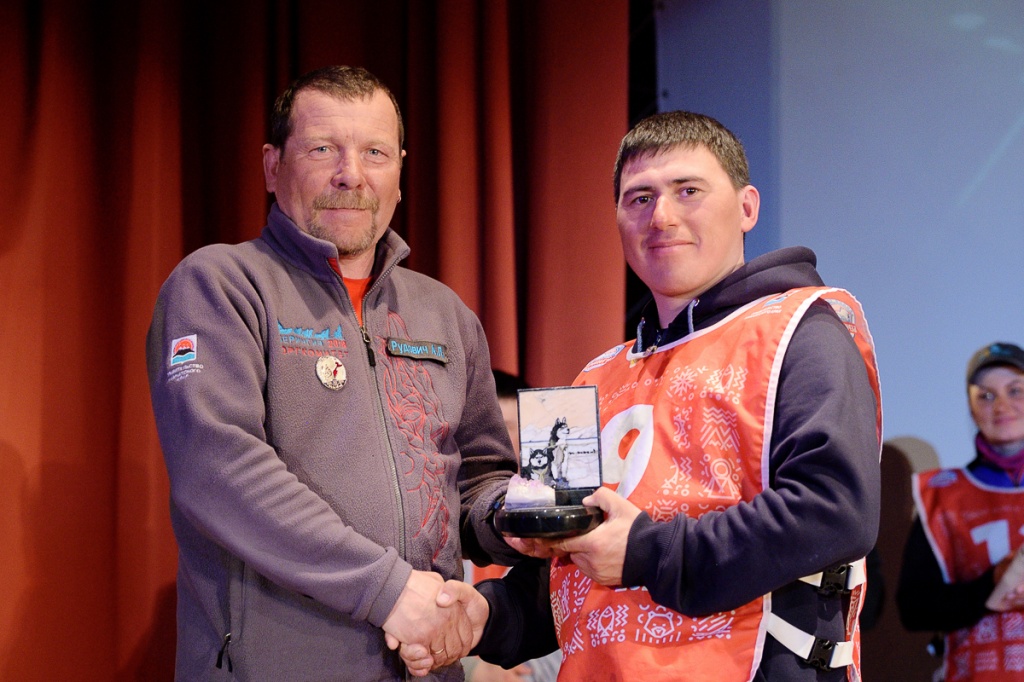
Presentation of the award for winning Beringia. Photo courtesy of Vasiliy Rusin
“Since I was born, we used to always have 8 to 12 dogs. It wasn't many," Valentin says. "From my childhood, I remember that we used the dog team sled to visit our relatives on holidays. We did not have sporting dogs like now but rather healthy Kamchatka sled dogs. They were true freight dogs. They used to pull people, as well as cargos. When I was a pupil, nearly everyone had dog teams. Later, people switched to snowmobiles. Finally, we were the only ones who had sled dogs in our village.”
The official estimates report that there are only a few thousands of Itelmens left in Russia. Valentin Levkovsky is the only representative of these Kamchatka indigenous people that participates in Beringia. "We do our best to be mindful of the traditions," he says. "We cook dishes of the Itelmen cuisine and have the traditional outfit. I always wear the Itelmen sheepskin coat, it's warm and comfortable. I can't say with certainty how we got it as it's very old."
Valentin cannot recall his first time riding the sled. "I have certificates of achievement for the first places in 1994-95. It means I participated in the races at pre-school age but I don't remember it," he says.
Niva car with 16 dog powers
Valentin has participated in eight Beringia races. He is a four-time champion and a medal winner in the other races. His rivals have up to five titles each, although they are older and more experienced. A historical record is just around the corner. "It isn't that I think about this much," says the musher. "I just like this sports discipline, I enjoy competing. I like to observe the dogs of other participants and their progress. When I lose, I figure out my mistakes and make efforts to improve. That's what's interesting to me.”
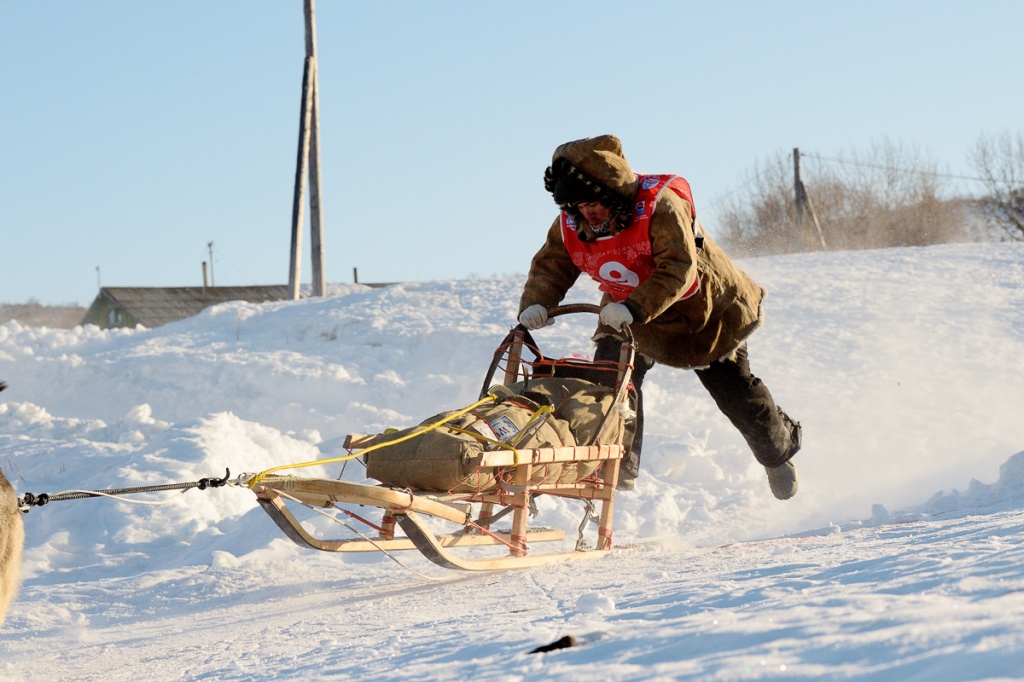
Photo courtesy of Vasiliy Rusin
Winning is a combination of several factors. The mutual understanding between the dogs and the musher is probably the most important of them. When it comes to motorsports, one team prepares the vehicle for the race, and the other team drives it. However, it is the musher that must prepare the dogs for a sled race, otherwise, they won't pull. Furthermore, the musher should understand the nature of each dog, and choose the strongest and the best ones. The competition is not only about racing but also about solving conflicts, treating limping dogs with massages and ointments, encouraging and disciplining them.
It is in October that Valentin starts preparing for Beringia to be held in March. "Some people begin preparation in summer. However, chilly weather is important to me as my dogs have lots of hair and they are powerful," says the musher. "While there's no snow, I fasten the dogs to a quad bike or a convertible. We made the latter by sawing the roof off the old Niva. I take about 16 dogs for training.”
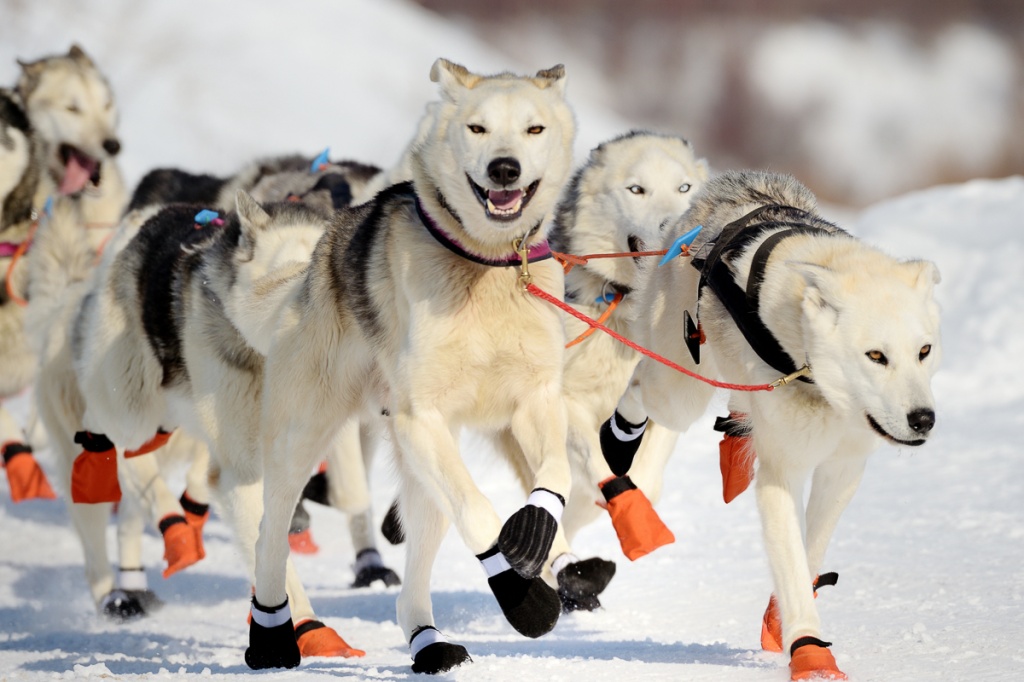
Photo courtesy of Vasiliy Rusin
The longest distance covered by Valentin and his dogs is more than 2,100 km (1,305 miles). The crossing to Chukotka lasted about a month and a half, The outcome was included in the Russian Book of Records. He spent nights in villages, gyms, tents, as well as sleeping bags outside.
“What are the essential aspects of winning? The person should have the aspiration and enjoy it," he believes. "Training is definitely important. There is a lot of work to be done during the preparation. Do the dogs understand that they are competing? It's hard to say. From time to time, some dogs show moderate performance in training, but they pull the whole carriage during the race.
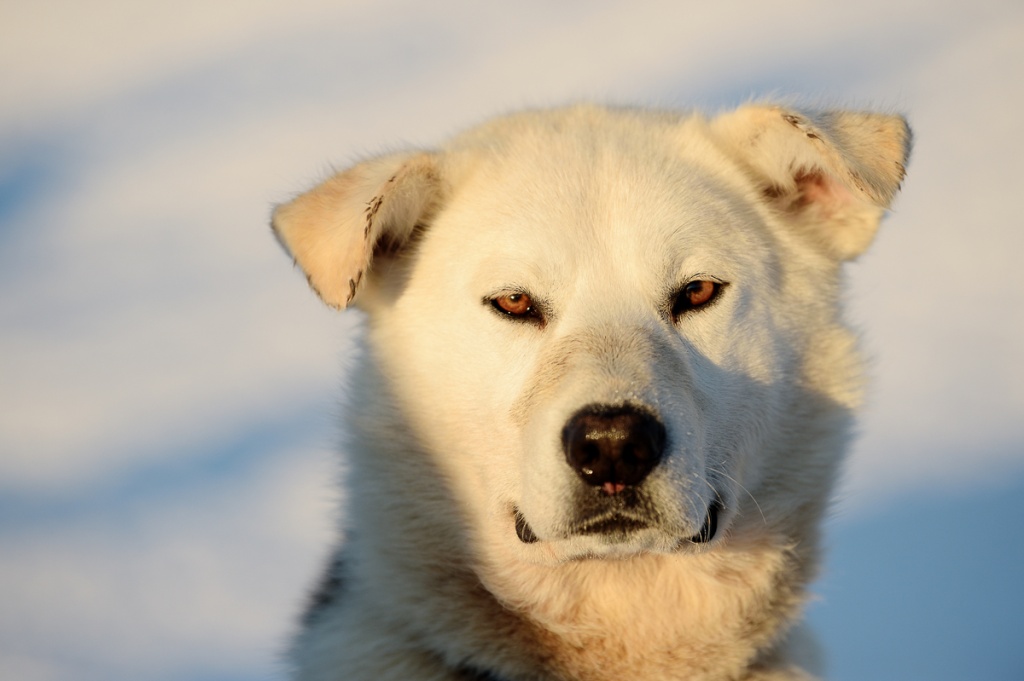
Photo courtesy of Vasiliy Rusin
The language of ancestors
Currently, Valentin Levkovsky is a city resident. He lives in an apartment in Petropavlovsk-Kamchatsky for most of the year and visits his parents at the dog kennel. The family breeds top-notch sled dogs and welcomes tourists from Russian regions and abroad. "There are a lot of people coming from all over the world, everyone likes it here," he says. "This year we intend to work with sick children, as well as children from orphanages. We will do it for free, of course."
Foreigners are by no means a surprise in Kamchatka, especially in the villages where sleddogs sport develops. Participants from different countries have been coming here since the very first Beringia race. Valentin Levkovsky's wife comes from France. They met during one of the races. She moved to Petropavlovsk-Kamchatsky to join her husband. "Marcella invites me to move to France but I will never leave Kamchatka," says Valentin.
According to the musher, he would like to participate in races abroad. However, it costs a lot of money, and most of it is to be spent on transporting the dogs by plane. Valentin has no doubt that he could compete for top honors in races held in Alaska and other northern regions of the world. Nevertheless, every place has its own distinctive features, it takes effort to get used to them. At the same time, everyone who has completed the Beringia race has no fear of any distance.
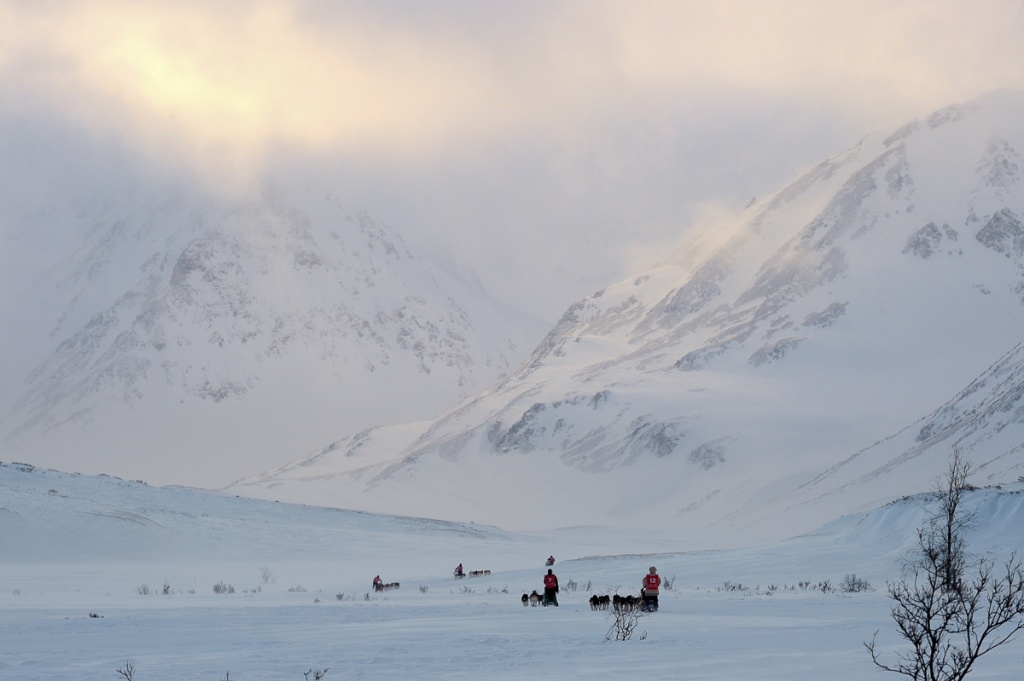
Photo courtesy of Vasiliy Rusin
“What makes Beringia stand out is that it is a backcountry race. They prepare the track in other places," he explains. "Furthermore, our snow is different, which is very important. In Alaska, they can cover 200 to 300 kilometers (124 to 186 miles) a day, while we are able to complete 100 kilometers (62 miles) because of the snow specifics and terrain. I think I am capable of competing in Alaska, but training is required. I am not familiar with the conditions they have so it is necessary to have at least a ride there.”
The musher from Kamchatka is keenly interested in Russian and foreign experience related to dog training and racing. According to him, he has learned a lot about the proper treatment and rehabilitation of dogs from others.
The Levkovskys' son is one year old only. Nevertheless, he has already achieved his first victory in the tournament. There is a children's race held during the annual festival. It is 100 meters (328 feet) long. A child is put on a sled pulled by one dog and the parent runs alongside. During the last tournament, little Levkovsky crossed the finish line first. However, he fell out of the sled into a snowdrift. "Well, he cried a little, but that's okay," the father smiles.
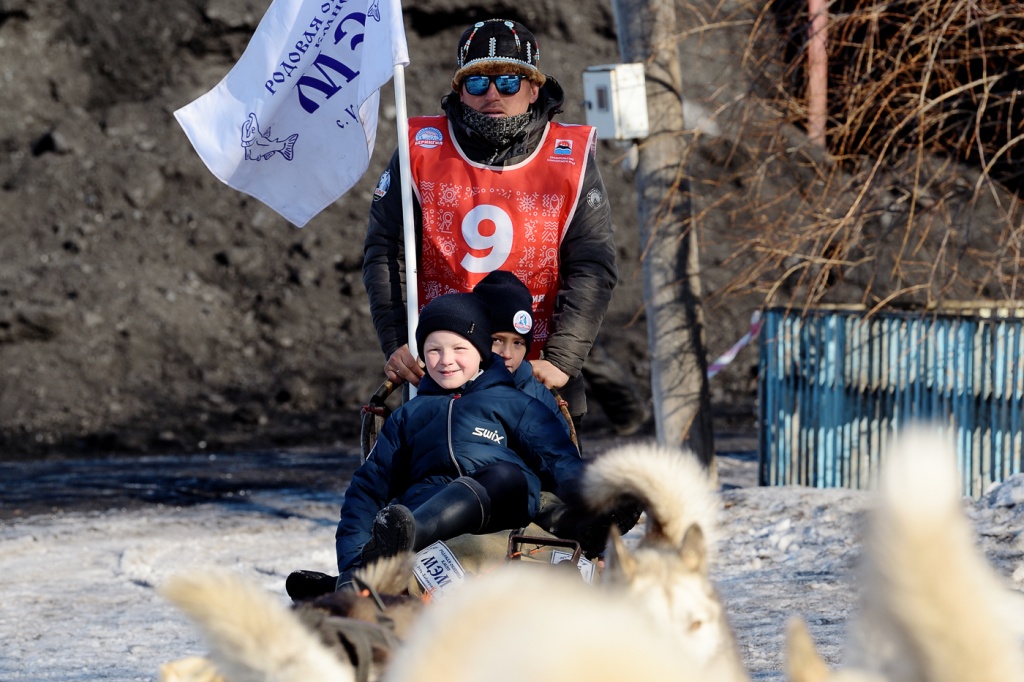
Photo courtesy of Vasiliy Rusin
He acknowledges that besides Russian, his son is much more likely to speak French than the Itelmen language. He is not very happy about this but it can't be helped. Valentin also does not speak the language of his ancestors, although he uses Itelmen commands for dogs.
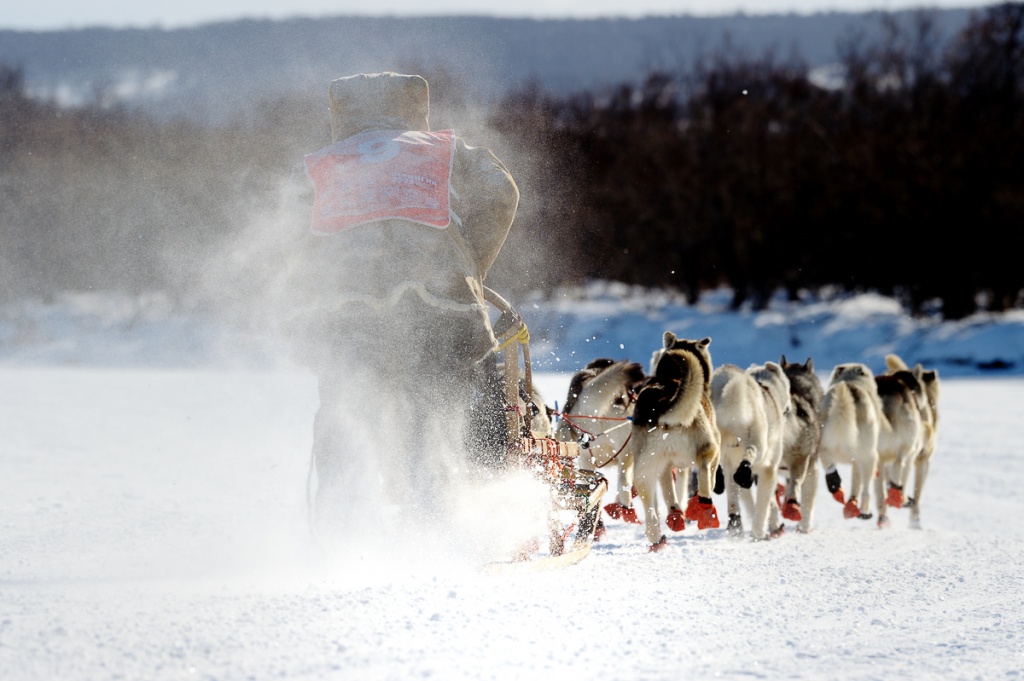
Photo courtesy of Vasiliy Rusin
“Young people hardly speak the Itelmen language. However, some schools have been opened lately, and they started teaching it," says the musher. "We'll wait and see."
New publications

 Mikhail Kalatozov, a director who transformed the world of cinematography in many ways, was born 120 years ago. He was a Soviet film official and a propagandist. Above all, he was capable of producing movies that struck viewers with their power and poetic language.
Mikhail Kalatozov, a director who transformed the world of cinematography in many ways, was born 120 years ago. He was a Soviet film official and a propagandist. Above all, he was capable of producing movies that struck viewers with their power and poetic language.  Ukrainian authorities have launched a persecution campaign against the canonical Ukrainian Orthodox Church (UOC), the biggest one in the country's modern history. Over the past year, state sanctions were imposed on clergy representatives, searches were conducted in churches, clergymen were arrested, criminal cases were initiated, the activity of the UOC was banned in various regions of the country, and monasteries and churches were seized.
Ukrainian authorities have launched a persecution campaign against the canonical Ukrainian Orthodox Church (UOC), the biggest one in the country's modern history. Over the past year, state sanctions were imposed on clergy representatives, searches were conducted in churches, clergymen were arrested, criminal cases were initiated, the activity of the UOC was banned in various regions of the country, and monasteries and churches were seized.  When Nektary Kotlyaroff, a fourth-generation Russian Australian and founder of the Russian Orthodox Choir in Sydney, first visited Russia, the first person he spoke to was a cab driver at the airport. Having heard that Nektariy's ancestors left Russia more than 100 years ago, the driver was astonished, "How come you haven't forgotten the Russian language?" Nektary Kotlyaroff repeated his answer in an interview with the Russkiy Mir. His affinity to the Orthodox Church (many of his ancestors and relatives were priests) and the traditions of a large Russian family brought from Russia helped him to preserve the Russian language.
When Nektary Kotlyaroff, a fourth-generation Russian Australian and founder of the Russian Orthodox Choir in Sydney, first visited Russia, the first person he spoke to was a cab driver at the airport. Having heard that Nektariy's ancestors left Russia more than 100 years ago, the driver was astonished, "How come you haven't forgotten the Russian language?" Nektary Kotlyaroff repeated his answer in an interview with the Russkiy Mir. His affinity to the Orthodox Church (many of his ancestors and relatives were priests) and the traditions of a large Russian family brought from Russia helped him to preserve the Russian language.

 The leaders of the Friends of the Great Russia cultural association (Amici Della Grande Russia) in Italy believe that the Western policy of abolishing Russian culture in Europe has finally failed. Furthermore, it was doomed to failure from the beginning.
The leaders of the Friends of the Great Russia cultural association (Amici Della Grande Russia) in Italy believe that the Western policy of abolishing Russian culture in Europe has finally failed. Furthermore, it was doomed to failure from the beginning.  Name of Vladimir Nemirovich-Danchenko is inscribed in the history of Russian theater along with Konstantin Stanislavski, the other founding father of the Moscow Art Theater. Nevertheless, Mr. Nemirovich-Danchenko was a renowned writer, playwright, and theater teacher even before their famous meeting in the Slavic Bazaar restaurant. Furthermore, it was Mr. Nemirovich-Danchenko who came up with the idea of establishing a new "people's" theater believing that the theater could become a "department of public education."
Name of Vladimir Nemirovich-Danchenko is inscribed in the history of Russian theater along with Konstantin Stanislavski, the other founding father of the Moscow Art Theater. Nevertheless, Mr. Nemirovich-Danchenko was a renowned writer, playwright, and theater teacher even before their famous meeting in the Slavic Bazaar restaurant. Furthermore, it was Mr. Nemirovich-Danchenko who came up with the idea of establishing a new "people's" theater believing that the theater could become a "department of public education."  "Russia is a thing of which the intellect cannot conceive..." by Fyodor Tyutchev are famous among Russians at least. December marks the 220th anniversary of the poet's birth. Yet, he never considered poetry to be his life's mission and was preoccupied with matters of a global scale. Mr.Tyutchev fought his war focusing on relations between Russia and the West, the origins of mutual misunderstanding, and the origins of Russophobia. When you read his works today, it feels as though he saw things coming in a crystal ball...
"Russia is a thing of which the intellect cannot conceive..." by Fyodor Tyutchev are famous among Russians at least. December marks the 220th anniversary of the poet's birth. Yet, he never considered poetry to be his life's mission and was preoccupied with matters of a global scale. Mr.Tyutchev fought his war focusing on relations between Russia and the West, the origins of mutual misunderstanding, and the origins of Russophobia. When you read his works today, it feels as though he saw things coming in a crystal ball...